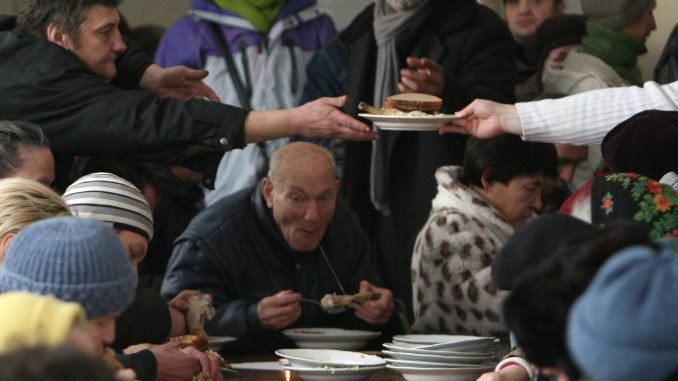
The new government promises to dedicate great attention to this issue, but it may very well get lost among the numerous other priorities it has identified.
Worse only in Serbia
Data from the EU statistics agency Eurostat suggests that in 2015 the general income inequality in Lithuania reached 37.9 in the Gini index where 0 means total equality of income, while 100 – total inequality.
Through the past decade the index has fluctuated in Lithuania. It rose after the 2008 global financial crisis, while it decreased between 2010 and 2012, but then proceeded to rise. Nevertheless for this whole period it exceeded the EU average.
Based on current data, the Lithuanian Gini index is only lower than Serbia, where it reaches 38.2, while the rest of European countries have lower indicators.
Seeking to even out
Prime Minister Saulius Skvernelis’ government programme states that Lithuania will commence an effective poverty reduction policy.
“Active and effective means of reducing poverty and social stratification will be put in place. The social stratification and income inequality indicator will be brought closer in line with the EU average,” it states.
The XVII Cabinet of Lithuania assures that in the long term by reducing income inequality it will seek to reform the tax system and implement progressive taxation, when public opinion supports the move.
“In our tax programme we propose minimal progressivity of taxes and considering the possibility of expanding on this in the future,” the programme states.
S. Skvernelis himself identifies reducing poverty and social stratification as one of the aims most important to him personally.
Nevertheless, while talking on the LRT show Dėmesio Centre, the PM pointed out education, public sector reform and reining in corruption as priorities as well.
The new Minister of Finance Vilius Šapoka has also spoken up about income inequality.
“Income inequality in Lithuania has exceeded the bounds of common sense,” he said during a live Delfi conference.
Due to this he intends to establish increased progressivity in the tax system. According to V. Šapoka, the most important focus right now is to increase the sense of security for those earning the least.
“So that they would be able to think beyond how to just get by, but instead could return to the natural human need to create and earn, this is why we need to reduce stratification. Respectively the progressivity of the system needs to rise,” said the politician.
Proposing to strengthen the middle class
A previously proposed candidate for the post of Minister of Economy, head of Investuok Lietuvoje (Invest Lithuania) Mantas Katinas states that the citizens of the country need to be encouraged to adapt to changes in the economy, they would then earn more.
“Today the economy is transforming into a digital one and a number of people earn great amount, while those who are not prepared for it earn little. There is no miracle cure here, but at the scale of Lithuania we have to do everything to assist those people to get on-board the contemporary economics train because, unfortunately, there are no other ways for them (those of lower qualification or participants of the old economy) to earn more,” he said in a Delfi broadcast while presenting the publication Reformų Gairės Konkurencingai Lietuvai [Reform Guidelines for a Competitive Lithuania].
According to Katinas, what is crucial for Lithuania is to expand the middle class, so as to make it comprise around 50% of society, then those earning less could be better supported through taxation, redistribution, social services and tax incentives.
“A great example is how healthcare staff and teachers could earn more if we had more business in Lithuania. More investors means more taxes and from this we could raise wages,” he explained.
Incompatible with competitiveness
Member of Seimas Aušra Maldeikienė holds a different opinion. She has been critical of the new government programme and states that it is chaotic and fails to explain how exactly it will resolve problems of inequality.
The economist said that the programme contradicts itself because it promises both to increase competitiveness and to reduce income inequality. According to her the two goals are mutually exclusive.
“They promise that over the next four years they will reduce Lithuanian income inequality up to the EU average, but there are no numbers. This means a reduction of almost 8 points, but technically it is not possible. Especially so if you explain that you will also increase competitiveness which you link to encouraging export,” Maldeikienė commented.
She also reminded that income inequality was identified as a major problem in Lithuania by the Organisation for Economic Co-operation and Development (OECD) as well, an organisation Lithuania seeks to enter.
In an OECD publication from later July this year it is stated that while Lithuanian growth is impressive, inequality remains high.
The organisation proposes to resolve problems such as emigration by creating more good jobs which would pay adequate wages.

Be the first to comment